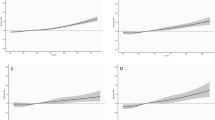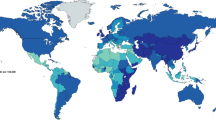Abstract
Objectives: This study investigated the effects of alpha-tocopherol and beta-carotene supplementation on the incidence of gastric cancer. Methods: A total of 29,133 male smokers, aged 50–69 years, participated in a placebo-controlled prevention trial, the Alpha-Tocopherol, Beta-Carotene Cancer Prevention (ATBC) Study in southwestern Finland between 1985 and 1993. The men were randomly assigned to receive alpha-tocopherol (50 mg/day) or beta-carotene (20 mg/day) supplementation in a 2 × 2 factorial design. We identified 126 gastric cancer cases during the median follow-up of six years. Of these, 122 were adenocarcinomas: 75 of intestinal type, 30 of diffuse type, and 17 of mixed type. Results: There was no significant effect for either supplementation on the overall incidence of gastric cancer: relative risk (RR) 1.21, 95% confidence interval (CI) 0.85–1.74 for alpha-tocopherol, and RR 1.26, 95% CI 0.88–1.80 for beta-carotene. Subgroup analyses by histologic type suggested an increased risk for beta-carotene on intestinal type cancers, RR 1.59, 95% CI 0.99–2.56. There were no differences across anatomic locations (cardia/noncardia) in the effects of alpha-tocopherol or beta-carotene supplementation. Conclusions: Our study found no overall preventive effect of long-term supplementation with alpha-tocopherol or beta-carotene on gastric cancer in middle-aged male smokers.
Similar content being viewed by others
References
Cannon G, ed. (1997) Food, Nutrition and the Prevention of Cancer: a Global Perspective. Washington, DC: American Institute for Cancer Research.
Fuchs CS, Mayer RJ (1995) Gastric carcinoma. N Engl J Med 333: 32–41.
Cancer Statistics of the National Research and Development Centre for Welfare and Health (2000) Cancer Incidence in Finland 1996 and 1997. Helsinki: Cancer Society of Finland.
Lauren P (1965) The two histological main types of gastric carcinoma: diffuse and so-called intestinal-type carcinoma. Acta Pathol Microbiol Scand 64: 31–49.
Fenoglio-Preiser C, Carneoiro F, Correa P, et al. (2000) Gastric carcinoma. In: Hamilton SR, Aaltonen LA, eds. World Health Organization Classification of Tumours. Pathology and Genetics of Tumours of the Digestive System. Lyon: IARC Press, pp. 37–66.
Parsonnet J, Friedman GD, Vandersteen DP, et al. (1991) Helicobacter pylori infection and the risk of gastric carcinoma. N Engl J Med 325: 1127–1131.
ATBC Cancer Prevention Study Group (1994) The alpha-tocopherol, beta-carotene lung cancer prevention study: design, methods, participant characteristics, and compliance. Ann Epidemiol 4: 1–10.
Teppo L, Pukkala E, Lehtonen M (1994) Data-quality and quality control of a population-based cancer registry. Acta Oncol 33: 365–369.
Beahrs OH, Henson DE, Hutter RVP, Kennedy BJ, eds. (1992) Manual for Staging of Cancer. Philadelphia: J. B. Lippincott.
Cox DR, Oakes D (1984) Analysis of Survival Data. London: Chapman & Hall.
Aromaa A, Kosunen TU, Knekt P, et al. (1996) Circulating anti-Helicobacter pylori immunoglobulin A antibodies and low serum pepsinogen I level are associated with increased risk of gastric cancer. Am J Epidemiol 144: 142–149.
Hennekens CH, Buring JE, Manson JE, et al. (1996) Lack of effect of long-term supplementation with beta carotene on the incidence of malignant neoplasms and cardiovascular disease. N Engl J Med 334: 1145–1149.
Blot WJ, Li J-Y, Taylor PR, et al. (1993) Nutrition intervention trials in Linxian, China: supplementation with specific vitamin/ mineral combinations, cancer incidence, and disease-specific mortality in the general population. J Natl Cancer Inst 85: 1483–1492.
Li J-Y, Taylor PR, Li B, et al. (1993) Nutrition intervention trials in Linxian, China: multiple vitamin/mineral supplementation, cancer incidence, and disease-specific mortality among adults with esophageal dysplasia. J Natl Cancer Inst 85: 1492–1498.
Correa P, Fontham ETH, Bravo JC, et al. (2000) Chemoprevention of gastric dysplasia: randomized trial of antioxidant supplements and anti-Helicobacter pylori therapy. J Natl Cancer Inst 92: 1881–1888.
Blot WJ (2000) Preventing cancer by disrupting progression of precancerous lesions. J Natl Cancer Inst 92: 1868–1869.
Ekstro¨ m AM, Serafini M, Nyren O, Hansson L-E, Ye W, Wolk A (2000) Dietary antioxidant intake and the risk of cardia cancer and noncardia cancer of the intestinal and diffuse types: a population-based case-control study in Sweden. Int J Cancer 87: 133–140.
Buiatti E, Palli D, Bianchi S, et al. (1991) A case-control study of gastric cancer and diet in Italy. III. Risk patterns by histologic type. Int J Cancer 48: 369–374.
Harrison LE, Zhang Z-F, Karpeh MS, Sun M, Kurtz RC (1997) The role of dietary factors in the intestinal and diffuse histologic subtypes of gastric adenocarcinoma. Cancer 80: 1021–1028.
Botterweck AAM, van den Brandt PA, Goldbohm RA (2000) Vitamins, carotenoids, dietary fiber, and the risk of gastric carcinoma. Cancer 88: 737–748.
LaVecchia C, Franceschi S (2000) Nutrition and gastric cancer. Can J Gastroenterol 14 (Suppl D): 51D-54D.
Author information
Authors and Affiliations
Rights and permissions
About this article
Cite this article
Malila, N., Taylor, P.R., Virtanen, M.J. et al. Effects of alpha-tocopherol and beta-carotene supplementation on gastric cancer incidence in male smokers (ATBC Study, Finland). Cancer Causes Control 13, 617–623 (2002). https://doi.org/10.1023/A:1019556227014
Issue Date:
DOI: https://doi.org/10.1023/A:1019556227014




